
5 Use Cases Of Generative AI (Gen AI) in Banking, Insurance Within Asia
by Johanan Devanesan January 19, 2024The emergence of generative artificial intelligence (Gen AI) represents a pivotal moment in the technological evolution, significantly altering the digital financial services landscape in the Asia Pacific region where we are seeing a rise of use cases for generative AI (Gen AI) in banking, fintech, and insurance.
This innovative type of AI is adept at creating new content, from text and images to intricate data patterns, by learning from pre-existing datasets. Its introduction carries profound implications for sectors such as banking and wealth management, where data generation and analysis are crucial.
The McKinsey Global Institute estimates that across various industries worldwide, generative AI could contribute an annual value ranging from US$2.6 trillion to US$4.4 trillion. Banking, in particular, stands to gain significantly, with an estimated yearly potential of US$200 billion to US$340 billion, equivalent to between 9% and 15% of their operating profits.
Much like its uber-popular consumer applications like OpenAI’s ChatGPT, generative AI offers the prospect of heightened efficiency and innovation within financial services in Asia. In the banking sector, for example, already generative AI can automate and optimise processes like customer service, fraud detection, and bespoke financial advice, enhancing customer experience and operational efficiency.
Another strongly projected is that wealth management firms in Asia will be able to utilise generative AI to sift through extensive market data, generating insights that inform more astute investment strategies and personalised portfolio management.
But that is just the tip of this transformational technology’s potential in financial services. Here are five real-world applications of generative AI in Asia.
UOB
United Overseas Bank (UOB) is currently trialling Microsoft 365 Copilot among its offices and branch staff, becoming the first bank in Singapore, and one of the first in Asia, to adopt this generative AI tool.
As part of the Microsoft 365 Copilot Early Access Program starting from October 2023, approximately 300 UOB staff members across various departments such as branch operations, customer service, and technology will utilise this AI tool to enhance their operational efficiency, ease of access, and collaborative efforts.
The implementation of Microsoft 365 Copilot will purportedly be integral to digitalising the way UOB employees work, enabling them to quickly summarise extensive documents and email conversations, convert raw data into graphical representations in spreadsheets, or provide succinct summaries of virtual meetings in Microsoft Teams.
Microsoft 365 Copilot offers UOB personnel the ability to seamlessly search and refer to internal bank information, with the Copilot intelligently sourcing and compiling pertinent data relevant to their current email or document tasks.
With this tool, UOB staff can creatively transform standard documents into dynamic presentations, streamline content, and tailor the tone of their communications effectively.
OCBC
Singlife
While banking might have the most immediate use cases for generative AI in Asia, it is not the only financial sector that can benefit from it. Financial services company Singlife has collaborated with Microsoft to assist rapidly growing insurance startups in integrating generative AI.
Singlife will join forces with Microsoft to select startups for the Singlife Connect Plus (SCP) programme, an enhanced iteration of the Singlife Connect (SC) accelerator and venture creation programme.
The SCP initiative concentrates on crafting scalable insurance distribution solutions, offering bespoke mentorship, and providing access to Singlife’s products and insurance expertise.
In addition, the programme aims to back eight insurtech startups, furnishing them with regulatory and compliance assistance to implement their market entry strategies.
Startups identified by Microsoft will be afforded technical advice, implementation support, and workshops on utilising generative AI in their offerings, access to the Microsoft Founders Hub, and connections with entities like OpenAI, LinkedIn, and Github. Additionally, they will be candidates for the Microsoft Pegasus programme.
Airwallex
Payments firm Airwallex has launched a generative AI tool to enhance its customer onboarding process. This tool, also employing large language models, is geared towards streamlining the company’s KYC, or “Know Your Customer” evaluations.
Designed to grasp the subtleties of various languages and cultures, Airwallex’s AI initiative was trained on extensive linguistic data, enabling the company to navigate these complexities more swiftly and effectively. Airwallex reports that this generative AI implementation has resulted in a 50% reduction in false-positive signals during the KYC verification stage.
Previously, Airwallex used rules-based analytics and Natural Language Processing (NLP) for scrutinising new clients’ websites. While effective in spotting high-risk keywords, it often produced a significant number of false positives.
In contrast, the generative AI adopts a more discerning approach in interpreting keywords, more accurately differentiating between harmless and potentially worrying content.
Moving forward, Airwallex aims to incorporate additional generative AI and NLP functionalities into its system. These developments are intended to offer customers bespoke services, prompt support, and more straightforward access to their information. The firm is planning to introduce further AI-enhanced features in 2024.
SymphonyAI
Predictive and generative AI enterprise software company SymphonyAI Sensa-NetReveal has unveiled the Sensa Investigation Hub, an investigation and case management platform powered by generative AI, enhancing financial crime prevention and detection for financial institutions in Asia.
The Sensa Investigation Hub harnesses predictive and generative AI technology alongside global domain risk and compliance expertise, resulting in an enterprise-grade, all-encompassing investigation platform that, as per the company, boosts investigator productivity by up to 70%.
Expanding on the previously launched Sensa Copilot for financial crime investigators, which aimed to quicken the pace of financial crime alert investigations, the Sensa Investigation Hub facilitates precise and swift investigation and reporting. It achieves this by merging an entity-focused view of risk with the rapidity and user-friendliness of generative AI.
Engine-agnostic in terms of detection, the Sensa Investigation Hub integrates with existing financial crime systems to offer a singular, consolidated risk perspective, audit-friendly features for regulators, and comprehensive transparency throughout the process.
While generative AI presents a frontier of opportunities for digital financial services in the Asia Pacific region, it also requires careful navigation of its risks and ethical considerations to fully harness its potential for the benefit of the industry and its customers.
Featured image credit: Edited from freepik







